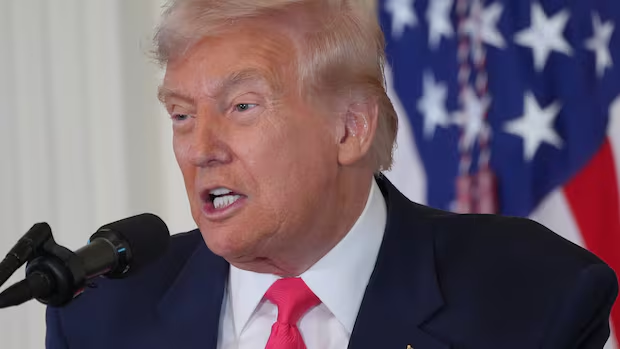It’s been a couple of rough weeks for Donald Trump. Is even worse to come for the U.S. president?

This could have been a good week for Donald Trump, in which the U.S. president could have chalked up a political win over the Democrats with the end of the government shutdown.
But any gloating time was short-lived, overshadowed by the spectre of Jeffrey Epstein and Trump’s past connection to the late convicted sex offender.
Instead, the White House was in damage control after Democrats released a series of emails related to the Epstein case, including one in which Epstein claimed Trump “knew about the girls.”
The latest revelation in the Epstein affair, which continues to dog Trump, marked perhaps the worst moment of what might be considered a couple of rough weeks for the president.
But it could get even worse next week, when the House votes on a bill to release the Epstein files — and public fissures between Trump and Republican lawmakers might start to emerge.
WATCH | Trump faces questions about Epstein:
Trump avoids media’s Epstein email questions
U.S. President Donald Trump is ducking press questions about newly released emails connecting him to convicted sex offender Jeffrey Epstein’s criminal activities ahead of an expected vote on releasing all Epstein case files by the U.S. House of Representatives as early as next week.
Epstein wasn’t the only political bump Trump faced this week.
His proposal to provide 50-year-mortgages was widely panned. As well, an interview with Fox News angered many in his MAGA base.
Then, with consumer concerns about affordability mounting and his polling numbers suffering, Trump relented somewhat on his signature policy on Friday night by rolling back tariffs on some food imports.
It marked a significant reversal of a policy that Trump has insisted has had nothing to do with rising inflation.
But it also may have been prompted by the political reverberations from these past two weeks, which have not been kind to the president.
Major election wins for Democrats
Trump’s biggest political loss came Nov. 4, when Democrats scored major victories in a series of elections, including gubernatorial races in New Jersey and Virginia, and Democrat Zohran Mamdani taking the mayoral race in New York City.
“Tuesday night’s resounding blue wave of Democratic victories across the country was partly a verdict on high prices and the cost of living during the first year of Trump’s second term,” Axios observed on its website.
His political troubles continued the next day, as his tariff regime looked like it could be in jeopardy. Oral arguments made by the government that justified the president bypassing Congress to impose tariffs seemed to be greeted skeptically by the U.S. Supreme Court.
In an opinion piece titled “Everything about Trump’s very bad week comes back to the same cause,” Jared Bernstein, former chair of the Council of Economic Advisers, said Trump had experienced what was arguably the worst week of his second term.
“And though the hits to him and his agenda came on several fronts, they had a unifying theme: affordability, as in the lack thereof,” Bernstein wrote for the MSNBC website.
“Trump, whose political instincts are rarely this far off, is making a big, basic mistake: telling people they’re better off than they know they are.”
Trump signs the funding bill to reopen the government in the Oval Office of the White House on Wednesday. (Jacquelyn Martin/The Associated Press)
Yet it looked for a time that Trump might get somewhat of a reprieve on Wednesday, when the president signed a bill to end the 43-day government shutdown, the longest in the country’s history.
The bill divided the Democratic ranks, with some accusing party leadership of caving to Trump.
Trump seized on the opportunity, saying that Democratic Senate Minority Leader Chuck Schumer had thought he could break the Republican Party.
“The Republicans broke him,” Trump told Fox News.
But the Democrats responded by hitting Trump where he’s politically vulnerable: the Epstein case.
Democrats on the oversight committee of the House of Representatives released three emails in which Epstein mentioned Trump. They cited exchanges between Epstein and author Michael Wolff and Ghislaine Maxwell, a British socialite and Epstein’s former girlfriend, who is serving a 20-year prison sentence for charges including sex trafficking of a minor.
A photo of Jeffrey Epstein provided by the New York State Sex Offender Registry, taken in March 2017. (AP)
One of those exchanges included an email from early 2019, where Epstein — who died in jail later the same year — is said to have emailed Wolff that Trump “knew about the girls as he asked Ghislaine to stop.”
Those emails were followed by Republicans on the U.S. House oversight and government reform committee releasing what they described as 20,000 pages of documents received from the Epstein estate.
As Trump contended with the fallout over the Epstein emails, he faced more political turmoil after an interview with Fox News host Laura Ingraham.
Trump told Ingraham that the U.S. needed to bring in more foreign workers through the H-1B visa program because American workers didn’t have the skills, angering some in his conservative MAGA base.
“Trump needs to get out of his bubble and back on the ground listening to the American people who elected him to work for us,” Savanah Hernandez, a contributor to the conservative group Turning Point USA, wrote on X. “His H-1B comment shows how out of touch with the base he has become.”
Yet it’s the Epstein file where Trump may be most vulnerable with this base. The issue has become a significant point of contention within the MAGA movement because of the refusal by the Trump administration to release more information.
“I think one of the telltale signs will be next when they take that vote,” said Chip Felkel, a South Carolina-based communications strategist who has worked on a number of Republican campaigns.
“If other Republicans decide they can’t … have this around their necks for not voting to release the files, that will, to me, show a break.”
Epstein much more of a problem with base: strategist
The vote next week on a bill to release the Epstein files stems from a petition that passed this week in the House, which was first introduced in July by Reps. Ro Khanna, a Democrat from California, and Thomas Massie, a Republican from Kentucky.
The effort was backed by all House Democrats and four Republicans, including Massie and Reps. Lauren Boebert of Colorado, Marjorie Taylor Greene of Georgia and Nancy Mace of South Carolina.
“The MAGA right is amazingly able to swallow and ultimately support anything that Donald Trump does,” Republican strategist Whit Ayres said. “My sense is that the Epstein issue is much more of a problem than anything he said about H-1B.”
That’s because the Epstein case is symptomatic of powerful elite men taking advantage of those with less power and influence — something the MAGA movement rallies against, Ayres said.
“It would not be surprising to see a lot of Republican House members vote for this resolution once it’s on the floor.”





